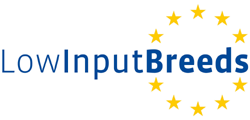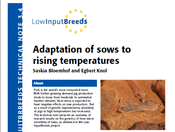Contact
Dr. Jascha Leenhouwers
Institute for Pig Genetics BV
Schoenaker 6
6641 SZ Beuningen
The Netherlands
Tel. +31 24-6779999![]() E-mail
E-mail
www.ipg.nl ![]()
LowInputBreeds: Key facts & figures
Development of integrated livestock breeding and management strategies to improve animal health, product quality and performance in European organic and ‘low input’ milk, meat and egg production - LowInputBreeds
- 5-year EU Collaborative Project, funded under the Seventh Framework Programme of the European Community for Research, Technological Development and Demonstration Activities
- Contract No. 222623
- 94 person-years of research
- Over 60 scientists
- 21 leading research and industrial organisations
- 15 countries
- 4 livestock species: cattle (dairy and beef), sheep (dairy and meat), pigs, poultry
- Running from 2009-2014
- Project coordination: Newcastle University and Research Institute of Organic Agriculture FiBL
- www.lowinputbreeds.org

LowInputBreeds Technical Note "Adaption of sows to rising temperatures"
Pork is the world’s most consumed meat. With further growing demand pig production tends to move from moderate to somewhat harsher climates. Heat stress is expected to have negative effects on sow production. But as a result of genetic improvement, sensitivity of pigs to high temperatures has increased. This technical note presents an overview of research results on the genetics of heat stress sensitivity of sows, as obtained in the LowInputBreeds project.
More information
Contact
Jascha Leenhouvers, coordinator of subproject on pigs of the LowInputBreeds project
Citation and download
- Saskia Bloemhof and Egbert Knol (2013) Adaptation of sows to rising temperatures. LowInputBreeds. Technical Note 3.4. Consortium of the LowInputBreeds project. Frick and Newcastle
Link
- LowInputBreeds.org: Subproject 3 on pigproduction systems
 This website was archived on December 19, 2017 and is no longer updated.
This website was archived on December 19, 2017 and is no longer updated.



